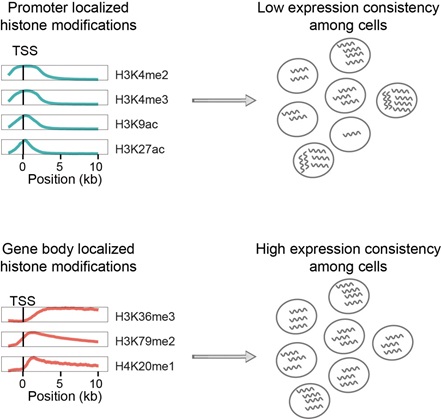Gene expression is a stochastic process that depends on the collision of bio-macromolecules during their Brownian movements. Therefore, gene expression variation among isogenic cells is widespread even under an identical condition. This phenomenon is frequently referred to as gene expression noise or cell-to-cell expression variability. Although gene expression noise may also play an important role during the differentiation of cells or in stress resistance, the gene expression noise reduces the consistency of gene expression among cells, and therefore, is generally deleterious. However, the regulatory mechanisms of gene expression noise in human cells remain largely unknown.
In a recent study, researchers from QIAN Wenfeng’s Lab at the Institute of Genetics and Developmental Biology, Chinese Academy of Sciences, discovered that the gene expression noise can be suppressed, to a certain degree, by gene-body-localized histone modifications (such as H3K79 methylation), in multiple embryonic developmental stages in human, as well as in mouse embryonic cells and in yeast.
By contrast, promoter-localized histone modifications (such as H3K4me3) amply expression noise when elevating the expression of a gene. Consistently, genes that are sensitive to dosage tend to use gene-body-localized histone modifications, whereas genes that can benefit from expression noise tend to use promoter-localized ones.
Their findings elucidate the “division of labor” among histone modifications, extend the “histone code” hypothesis, and shed light on the optimization of transcriptome in evolution.
This work entitled “Independent regulation of gene expression level and noise by histone modifications”, has been published on
PLOS Computational Biology (
DOI:10.1371/journal. pcbi.1005585).
This work was supported by the 973 programs from the Ministry of Science and Technology.
Gene-body-localized histone modifications promotes gene expression consistency among isogenic cells (Image by IGDB)
Contact:
Dr. QIAN Wenfeng
 Gene-body-localized histone modifications promotes gene expression consistency among isogenic cells (Image by IGDB)Contact:Dr. QIAN WenfengEmail: wfqian@genetics.ac.cn
Gene-body-localized histone modifications promotes gene expression consistency among isogenic cells (Image by IGDB)Contact:Dr. QIAN WenfengEmail: wfqian@genetics.ac.cn CAS
CAS
 中文
中文




.png)
